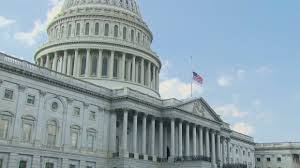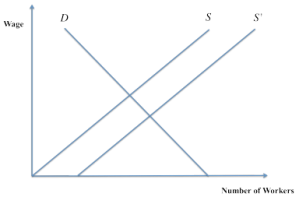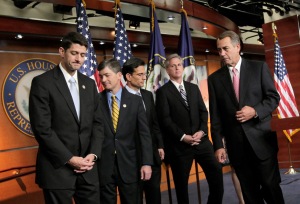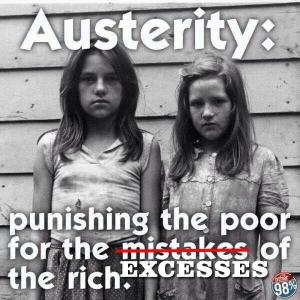 Consider this: What if cutting federal unemployment benefits resulted in a lower unemployment rate? I would argue that will happen and I think it is the darker side to the GOP cutting strategy.
Consider this: What if cutting federal unemployment benefits resulted in a lower unemployment rate? I would argue that will happen and I think it is the darker side to the GOP cutting strategy.
Cutting unemployment benefits puts people in an even more desperate situation that unemployment brings. With the benefits at least the unemployed have some money coming each month, meager as it might be. Without the benefits they don’t even have that.
As a result, desperation will push people to take lower paying jobs, often jobs below their experience, training and skills. So you would have more people working, but one could hardly say that the labor market has improved in a scenario like this.
 Plus it won’t happen over night. It isn’t as if there are millions of low-paying jobs going begging every week. This is another layer to the dark side of the cut benefit strategy.
Plus it won’t happen over night. It isn’t as if there are millions of low-paying jobs going begging every week. This is another layer to the dark side of the cut benefit strategy.
More workers in the labor market — especially desperate workers — will put downward pressure on wages and compensation. This is key, especially at a time when many are lobbying for an increase in the federal minimum wage.
Eventually, the labor market will find a new equilibrium at a lower wage. Additionally, jobs may grow organically as business invests less in other labor markets, reduces productivity demands from cheaper labor, or reduces other cost saving measures allowing more people to work for less.

House Budget Committee Chairman Rep. Paul Ryan, R-Wis., Rep. Jeb Hensarling, R-Texas, House Majority Leader Eric Cantor of Va., House Majority Whip Kevin McCarthy of Calif., and Boehner. (AP Photo/J. Scott Applewhite)
Sure, if people start working at lower wages, it could have the effect of pushing the demand curve out, representing increased economic activity. And if people make $300 a week at a low-paying job instead of getting it from the government, it’s a wash. But what is the real long-term benefit of increasing demand though an under performing work force? If highly skilled workers end up working jobs once deemed the domain of part-time high school workers, does that bode well for the future? How does an economy with a neglected work force maintain competitive?
In the end, extending unemployment benefits isn’t about the paltry $26 billion that would be required — and the economic benefit that that public investment would deliver — but rather it is part of a larger strategy to reduce further the costs and regulations of labor. It is one more step back from the progressive labor policies that built the American middle class and its broadly shared economic benefit.
Look at it this way, if you’re unemployed, living below your employed standard, are you going to take your unemployment check and squirrel it away in a savings account that will give you “unjust” benefit? No, not very likely. Most likely you’ll spend every dime to cover your needs. You won’t pocket the benefit as a so-called “Taker” might. The wealthy do that with their tax cuts and subsidies because they can afford to.
Those dollars in benefits circulate in the economy. Cuts to jobs just in the public sector have likely slowed our economic recovery by a point or two. Cuts to unemployment benefits will slow things further. But if you’re future is in finance and large investments, this matters very little to you. It isn’t that complicated, think about who will be hurt by cutting benefits and who won’t.
If Republicans really want to save $26 billion, tell them to cut big business subsidies. Tell them to rebalance tax rates so the middle class doesn’t pay a larger percentage of income to taxes compared to the wealthiest. (Tax credits to higher income earners cost us billions annually and to what gain?) Or perhaps there is something that can be cut from defense? Maybe take a year off starting new wars, for example.
There are ways to find the $26 billion needed to extend unemployment benefits, but as usual, the GOP wants the costs of those cuts to fall primarily on the people already shouldering the bill. God forbid we turn to fair tax policy, for example, or cut our questionable subsidies that support record corporate profits sitting in overseas banks.
But all of this might be a secondary debate. I argue that there are people smart enough to know better. Unfortunately their real goal isn’t a strong America for all, instead they want more of the pie, even if that pie is going to shrink. And you can achieve that by reducing labor costs.
In the end they will be able to say that unemployment is down (which I think it will be for the reasons given here) and money saved. Don’t spend it, it is saved, right? Unfortunately, the costs of those savings will be poorly understood, even as the effects of it hurt us all.









I hope sincerely that no one will be left without an income.